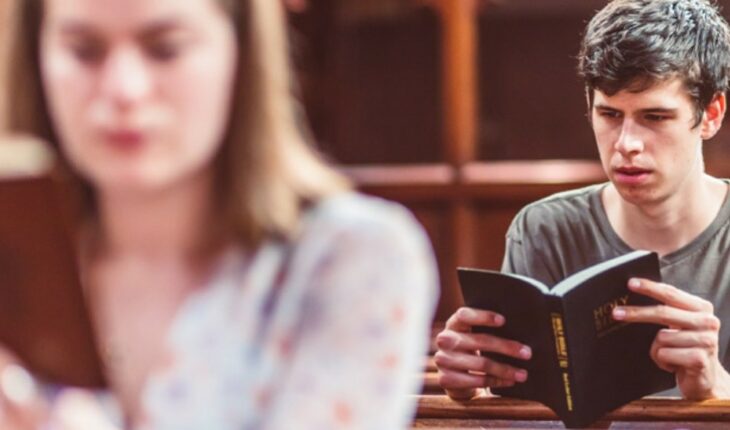Reading from the Holy Gospel according to Luke (12:13-21):
At that time, one of the people said to Jesus: “Master, tell my brother to share the inheritance with me.” He said to her, “Man, who has made me a judge or arbiter among you?” And he said to them, “Look, beware of all kinds of greed. For even if one is left over, his life does not depend on his goods.” And he proposed to them a parable:
“The lands of a rich man produced a great harvest. And he began to take calculations, saying to himself:
“What will I do? I have nowhere to store the harvest.” And it was said, “I will do the following: I will tear down the barns and build larger ones, and I will store there all the wheat and my goods. And then I will say to myself: my soul, you have goods stored for many years; rest, eat, drink, feast happily.” But God said to him, “Fool, tonight they are going to claim your soul, and from whom will it be what you have prepared?” This is he who treasures for HIMSELF and is not rich before God.” Word of the Lord.
It is not what you already have, nor what you are going to achieve, but what you are going to achieve that well deserves struggle and effort. If one’s life does not depend on one’s own things, it is of little use to go out of your way to have them. Jesus refuses to mediate a dispute between brothers, not to avoid a controversial decision, but to free his interlocutor from his eagerness to possess. He doesn’t want to get into trouble because he doesn’t want to prosecute anyone; it seeks to open everyone to the righteousness of God. It is not judicious to lose family life in this case for that which cannot keep us alive. The parable develops the teaching of Jesus: the landowner acts wisely by foreseeing a good harvest, but does not realize that what he has is greater than what he lacks; and he does not take so much care of what he already has, because his desires to possess more are great.
Whoever does not put his security in God will not be able to secure his goods even one night, because no one, not even himself, can assure him of his life; his foolishness would be greater than his barns: he is not to fill our lives that which is not yet possessed; allowing oneself to be possessed by what one can have still leads one to losing what one has always had, to God and his goods; good is not what we lack, but what God would be willing to grant us if he were our only good. In the face of a God who claims to be our unique good, they can only be born with the desire to have him. And if you have it, no other desires or other goods are maintained.
That on one occasion a stranger sought support from Jesus to help her settle a family dispute over an inheritance indicates the degree of social acceptance that Jesus had already obtained with his preaching and the authority that was granted to his opinions. However, the fact itself may seem to us to be a mere unimportant anecdote; so accustomed are we to see how families are divided by patrimony to distribute that it seems logical to us that Jesus avoided pronouncing himself on such a familiar matter.
But if it is true that he did not want to enter into an argument between brothers, it is no less true that he did not miss the opportunity to teach all his listeners the position that goods must have in life. Although it did not seem prudent for him to pacify a family, he took the opportunity to instruct the people who followed him. Jesus answered the brother who implored justice – only justice! – that it is better to renounce the goods that are due to us than to lose our lives, and the family in the attempt to recover them. What good would it be to gain what is ours if we don’t have time to enjoy it? Why own many things, if we are not masters of our lives?
And, if the abundance of goods does not ensure survival, whoever commits injustice by obtaining them is not sure of enjoying them. It is precarious to base one’s existence on goods that cannot guarantee it. Having things that belong to the brother is not the best way to maintain one’s life. Accumulating what is owed to others may make us richer, but it certainly makes us less human. We are not better for the goods we have, nor does it do us good to keep what belongs to the brother. The things we have, the people we live with, are good to the extent that it sustains our lives, satisfying our most urgent needs, be they bread or love. It is not worthy of being stolen from anyone what does not ensure a day our life. However necessary it may be, no good is as precious as one’s own life or the life of the brother: we should be able to renounce everything except them.
Therefore, whoever puts his trust in what he has achieved, who encrypts his happiness in abundance, will leave his goods when he leaves life, will be left without property and without God. Something very serious has to be hidden in that attitude of the rich, so reasonable in appearance, that Jesus puts in bocGod’s condemnation – something unusual in his parables – it is foolish who puts his happiness into owning things, who feels secure because of how much he will have, without realizing that, no matter how much he accumulates in life, he does not know if he will wake up again tomorrow. Goods that can so easily be lost are not to be the most cherished goods, nor are they the most precious. Not having God as the supreme good makes all the goods you have useless. To put in something other than God the reason for happiness is to risk losing it; he will not be able to insure his goods even one night even if he does not ensure that God is his Good.
To enjoy the presence of God in the Mass and in the family!
Original source in Spanish
Sunday, July 31, 2022 Cycle C
July 31, 2022 |





